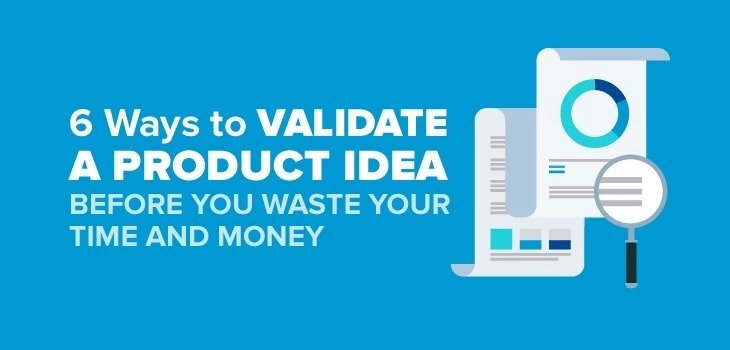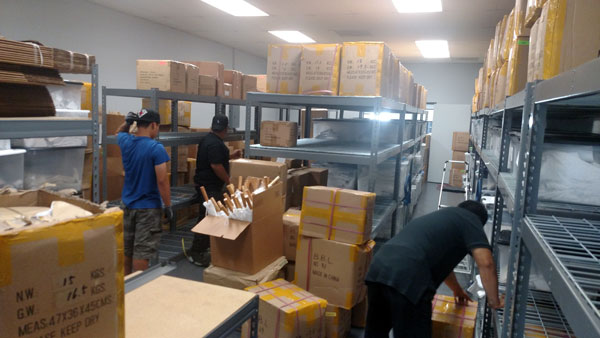Starting a business selling physical products that you’ll operate yourself or with a team is entirely different from other types of companies. Instead of digital products, it means entering a world of product development, production facilities, procurement, delivery, retailing and sales!
There are many factors involved with getting started in a product-based business. To help you, here are some useful pointers.
Validate the Business Concept and Product Ideas First

6 Ways to Validate a Product Idea Before You Waste Your Time and Money
While being an entrepreneur is exciting and interesting, it shouldn’t be something that you dive into without proper thought and careful consideration. This is equally true of the actual business concept and product ideas that you already have in your mind.
Sketch down on paper what your business idea is. Look for market research or conduct some to see if the concept is valid. Most new entrepreneurs blindly believe that their idea will work without playing Devil’s Advocate by taking the other side and asking why it should? However, when doing so, it highlights any shortcomings in the initial ideas and lets you rework them (or abandon them for something far better).
Equally, consider your product ideas too. Think about:
- Whether there’s a proven existing market for the product already?
- Is there enough demand to make it worth producing it?
- Is it improving upon another brand’s existing product or something completely new?
- Will customers need educating about what the product is if it’s breaking totally new ground?
- How will the first production order be and how much will that cost?
- What’s the unique selling point of your product to differentiate it from the rest of the market?
How Will You Source or Get the Products Manufactured?
Will the first product be made in parts, shipped out and assembled at your premises? Or, will it be produced at a manufacturing plant with your new brand’s logo on it, boxed, and then shipped to you?
How will you find a manufacturer capable of producing your product to a high-quality? Have you dealt with manufacturers before? Do you understand about minimum order sizes, follow-up minimum orders or the need to first refine and eventually approve of their product samples before placing a production order?
What about shipping, importing and any duties involved with the receipt of the goods? It gets more complicated if the goods are coming from abroad…
To become highly knowledgeable in the procurement/ordering and shipping arena, it’s sensible to learn about this distinct facet of a product-based business. Taking a masters in supply chain management, which can be studied online in your spare time, will doubtless provide a true insight into what’s involved, demystify the many business processes, and clarify how to best proceed.
What Money Will Be Required to Get Started?

Inventory Management And How To Handle Cash Flow For An Online Store
Have you calculated what money will be required and when to fund the business? Not all funds will be needed on day one; some may be staggered and only required when placing significant product manufacturing orders at a factory or leasing a retail space.
-
Funding the Business from Savings or Investments?
Are you planning to fund the business from your savings or liquidate some investments to do so? The size and makeup of the business may partly determine the funds required.
-
Money Requirements Depend on Plans and Restrictions
Retail spaces are difficult to secure and costly with lease and rent payments. By contrast, a physical products business may initially be started at home and later expanded to an office/warehouse combination. Do consider restrictions of zoning laws, local traffic limitations, safety concerns and what noise disturbance may be unacceptable when running a business from home.
-
Business Lenders and Angel Investors
Have you looked at tapping into an SBA loan or another type of business financing to help get the business off the ground? Or do you know some wealthy investors that are involved with angel investing who might be interested in taking an equity stake in exchange for providing some seed capital?
Where & How Will the Products Be Sold?
Are you planning to store your goods at a drop-shipping company and let them ship the product to your customers? Or will you lease a warehouse and office combo and sell the products from an online store, for example, eBay or a Shopify store?
Will a retail space with a storage facility at the back allow you to connect with potential customers and demonstrate the products in-person? Is this type of product one that needs to be demonstrated in-person or can it be easily sold online, even if it’s not from a familiar brand? Questions like these can impact your decision on whether to enter the retail environment or not.
Do You Have a Marketing Plan Yet?
30 Marketing Plan Samples and 7 Templates to Build Your Strategy
Whether you’re planning to get a retail store or selling via Shopify or a separate website, customers usually don’t appear out of thin air. You need a plan for how to acquire them.
-
Advertising Doesn’t Work Right Away
In most cases, people need to have a clear sense of what you’re offering before they’ll place an order. Advertisements featuring your brand and product usually need to be seen several times before someone will consider making a purchase. And that all takes longer than you’d think.
-
Plan for How You’ll Market Successfully
Create a plan for how you will successfully promote your business and products. No one else will do it for you. In any market, you’ll have competitors looking to:
- Dominate the market
- Copy your best ideas
- Innovate quicker than you can
- Market more aggressively and more often
How do you plan to offer something unique, capture potential customers’ interest and sell to them?
-
How Much Will Each Customer Cost to Acquire?
What will the customer acquisition cost be? Will a single sale cover it? Or will you need either a large order or multiple orders to become profitable on a per-customer basis? Figuring this out early on is enormously useful.
A product-based business is harder than a digital one. That’s for sure. However, it provides more of a hands-on feel, which is preferred by many business owners. It’s also often clearer that their product is helping the purchaser (unlike a digital product they may purchase and never actually use). This makes it worth the effort to learn how to create a physical goods business and scale it up.